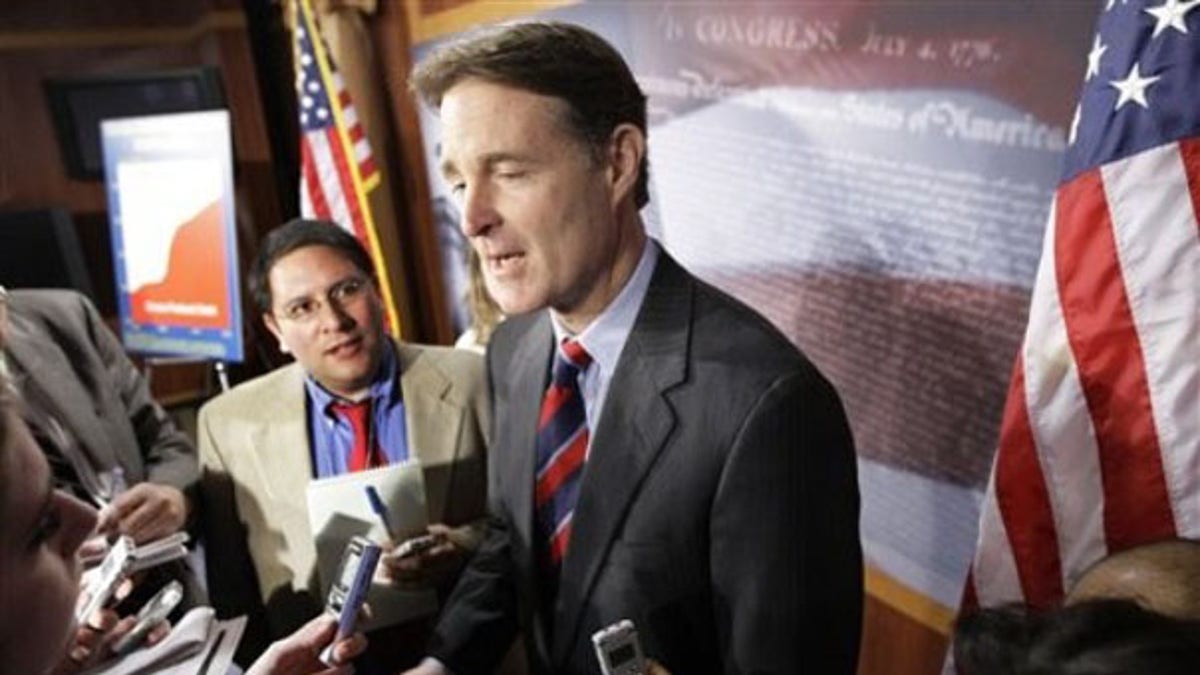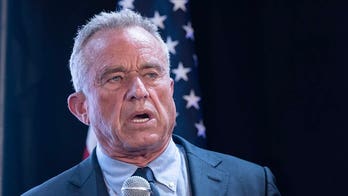
Jan. 26: Indiana Sen. Evan Bayh answers questions on Capitol Hill. (AP Photo)
WASHINGTON -- Sen. Evan Bayh's indictment of Washington, D.C., has congressional politicians squirming, small government conservatives howling and the states' governors offering advice, suggesting that the Indiana Democrat's analysis bears more than a kernel of truth.
The two-term senator, heavily favored for re-election November, announced last week that he would retire at the end of his term, saying he's fed up with the system.
Congress is "stuck in an endless cycle of recrimination and revenge," Bayh wrote in an op-ed Sunday in The New York Times, explaining what he meant.
Bayh wrote that the use of procedural maneuvers like the filibuster "prevent the Senate from ... conducting routine business."
Concluding that the atmosphere has been poisoned since the era when his father, Birch Bayh, who was Indiana's senator from 1963 to 1981, served, Bayh wrote that collegiality is gone.
"Today, members routinely campaign against each other, raise donations against each other and force votes on trivial amendments written solely to provide fodder for the next negative attack ad. It's difficult to work with members actively plotting your demise. Any improvement must begin by changing the personal chemistry among senators," he wrote.
Many of those in the partisan vortex that is Washington tacitly acknowledge the complaints by Bayh, but blame the other side for roadblocks.
The Democratic-led Congress "has been failing the American people," said Rep. Mike Pence, R-Ind., complaining about the "take it or leave it approach" to health care reform.
"It's unthinkable that a massive health care bill was brought to the floor and the minority party was allowed one amendment," he said on NBC's "Meet the Press."
"There's been a calculation by the Republican leadership that getting nothing done ... is to their political advantage," countered Rep. Chris Van Hollen, D-Md., chairman of the Democratic Congressional Campaign Committee, who sat next to Pence.
On "Fox News Sunday," Senate Minority Leader Mitch McConnell said Senate Majority Leader Harry Reid's decision to pull an $85 billion bipartisan jobs package before the Presidents Day recess was a sign of Democratic intransigence. Earlier, Reid had complained that McConnell wanted to slow down the vote by adding too many amendments.
"Senator Bayh referred to this in his retirement announcement as one of his frustrations. I share his frustration," McConnell said.
But governors -- in town for the National Governors Association meeting through the weekend -- are a much more collegial bunch, and while many don't want to pass judgment on their elected allies in Congress, they suggested Washington get over itself.
"We have two major political parties in our country, and that's fine, they have different points of view. And the robustness of the political process is that those views come to the table, they are debated and reconciled. But ultimately something has to happen," said Vermont Gov. Jim Douglas, a Republican. "And when we look at Congress, all of the bickering, the inaction, I think the American people are really fed up."
"There is no doubt that people view what's going on here in D.C. as not being relevant to what they are experiencing. The fact that nobody can get anything done is extremely frustrating," said Michigan Gov. Jennifer Granholm, appearing on "Fox News Sunday."
"I am a Democrat and proud to be a Democrat, but I did not run to be governor of the Democrats," said Massachusetts Gov. Deval Patrick, who appeared with Douglas on CNN. "I serve everybody. And I think that expectation is there and it's a fair and appropriate expectation of the public for people we send to Washington as well."
Former Secretary of State Colin Powell said he doesn't think the system is broken, but it is in trouble.
"We're a partisan nation. We were raised as a partisan nation," Powell said, claiming the Founding Fathers intended for there to be arguments.
"But just as they did in Philadelphia when they were writing the Constitution, sooner or later, you've got to compromise. You've got to start making the compromises that arrive at a consensus and move the country forward," he said.
Appearing on CBS' "Face the Nation," Powell added that too many extreme left and extreme right positions are being promoted -- and the echo chamber of new media is creating a cacophony.
"The Tea Party movement has also, now, become a force in American politics. And of course, you've got the overhang of cable television and bloggers and the Internet, all of which heightens tension. ...
"So our system is not broken. It's a great system. But it's in some disarray right now. And the American people are looking for their leaders to fix it. They're looking for the White House to fix it. And they're looking for leaders in both the Republican Party and the Democratic Party in the House and Senate to start finding ways to compromise and get the country moving and not just scream at each other," he said.




